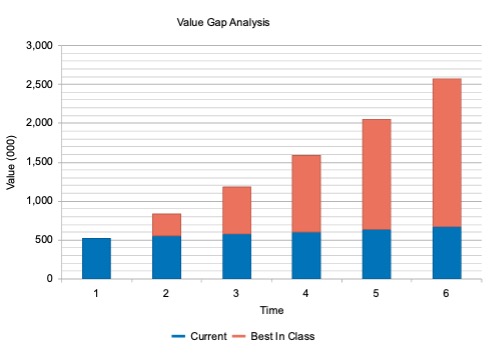Closely Held Advisors is a valuation and exit planning advisory practice. We counsel business owners in the process of understanding the actual and potential value of their business, then implementing a plan to protect, grow, and ultimately harvest its value.
For more information, news and analysis for closely held business owners on exit and succession planning, business valuation and business risk bulletproofing, visit www.closelyheldadvisor.com.
The benefit of a successful exit plan is growth: growth in profits today, growth in value if there is a transition, and growth in free time away from the business. By focusing on maximizing the value of the business, we ensure that owners are able to reap the rewards of their hard work when the time comes to transition out of the business.
Today’s Value and Tomorrow’s Exit
Accurately assessing the value of a business requires a formal valuation. It enables owners to make informed decisions about its future. This knowledge allows an accurate assessment of its strengths and weakness and the development of strategic plans to make it a ‘best in class’ operation.

The chart here illustrates the value of exit planning to a closely held business in which the husband and wife owners work full time but which, when compared to its peers, is at the lower end of the scale on operational measures of growth, efficiency, and profitability. The business provides a good wage to its owners, but the truth is that they own a job, not a salable business.
Through hard work and sacrifice of such things as vacations, weekends off, and time with family, these owners earn nearly $350,000 a year. Businesses in this industry are sought after and, when sold, bring 2 to 5 times the owner’s discretionary earnings. Strategic buyers may even pay six times discretionary earnings.
The owners embark on an exit plan and apply the Value Enhancement Method developed by the Exit Planning Institute, growing profits by inflation plus 5% over the next five years and becoming a ‘best in class’ operation.
At the end of the process, the owners have entrusted the daily operations of the business to managers groomed from the work force or hired from the outside. They spend less time in the office, and profits have grown $515,000.
But because they are now an attractive business with good management, well documented systems, and efficient operations—aa turnkey operation, in fact—tthe value of the business has grown by $1.9 million over the five-year period.
With Visibility Into the Future, the Plan Can Take Shape
From the valuation report that the owners commissioned, they come to an understanding of where their business needs to improve.
- Stabilize and protect. A surprising number of closely held businesses have no succession plan or protection against the ‘three Ds’, death, disability, and divorce. Many closely held businesses have no protections in place for critical intangible assets like trade secrets, have not employment or non-disclosure agreements with key employees, or have adequate insurance.
- Identify and address weaknesses. A critical benefit of a good valuation is that it uses benchmarks in the industry and tells the business owner how their company is doing in comparison to peers. A company that is behind its competitors on these key measures will not attract buyers.
- Develop intangible capital. Intangible capital is what drives business value. Relationships with customers, a well-trained in-place work force, reputation, and well-documented procedures are valuable assets that do not appear on the balance sheet, but they drive profitability and value. Exit planners advise owners on strategies to build and enhance intangible capital.
- Identify exit options. Many business owners have not addressed the hard truth of just how much money they need to maintain their current lifestyle if and when they stop working in the business. There are often family dynamics involved in the transition. Some owners that have successfully implemented an exit plan will decide not to sell. They have more income and more free time, so the decision is ‘not yet.’ For others, the ‘not yet’ may be driven by not enough. Exit planners bring professionals to the process to assist in the answer to these questions.
- Manage the Sale Process. Exit planners use their professional connections and experience to guide business owners through the sale process, assisting in the process of selecting a merger and acquisition firm or business broker.
 The Business Divorce Law Report
The Business Divorce Law Report